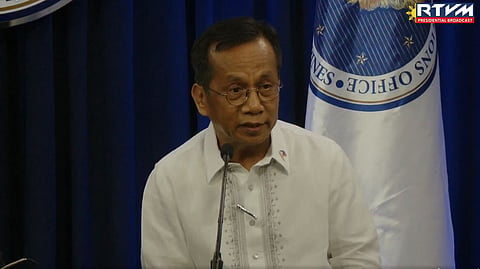
- NEWS
- the EDIT
- COMMENTARY
- BUSINESS
- LIFE
- SHOW
- ACTION
- GLOBAL GOALS
- SNAPS
- DYARYO TIRADA
- MORE

National Economic and Development Authority (NEDA) Secretary Arsenio Balisacan assured the public in a Palace briefing on Thursday that the Philippine economy will not be affected by “political noises” as the government is focused on sustaining its growth.
“It’s business as usual for us, and I don’t think these political noises will have any impact on the economy,” he said.
“Since the late 1990s, the economy has continued to progress despite the political noise simply because the economic policies and our directions have been broadly sustained.”
“And for us in this administration, we are focused on ensuring that the goals, targets, and strategies outlined in the Philippine Development Plan will be achieved,” he added.
Earlier, President Ferdinand Marcos Jr. met with the economic managers to discuss future projects and the current state of the economy after the Philippines received an A- rating for short-term credit and a BBB+ long term rating.
Marcos was joined by House Speaker Martin Romualdez and Senate President Francis “Chiz” Escudero in the meeting with some Cabinet members.
While Balisacan did not specify the “political noise” he was referring to, the President and Romualdez on Monday clapped back at Vice President Sara Duterte for saying last Saturday that she had hired an assassin to kill them, as well as First Lady Liza Araneta-Marcos, in the event she herself was killed.
Duterte has accused the Marcos administration of persecuting her, particularly its allies in the House of Representatives who are investigating her office’s utilization of confidential funds.
According to Balisacan, Marcos sought an assurance from Congress that his administration’s priority projects would be funded in 2025 and in the coming years.
As of November, NEDA has lined up 186 infrastructure flagship projects (IFPs) across the country, focused on the National Capital Region, Regions 3, 7, and 10.
Consolidation
NEDA assured that even with the projects underway, there is no need to impose new taxes. Still, Balisacan suggested improvements to existing tax laws.
“We have our fiscal consolidation program that targets the deficits and debt levels in the medium term, and we’re on track on implementing that plan,” he said.
“But the key to enhancing our revenue is improving the administration of our tax laws,” he added.
Amid criticism of the diversion of health-related and social security funds to other purposes, Balisacan guaranteed the funds would be used for government projects.
“I don’t have the details on where those funds have actually been used, but broadly, yes, because they are meant to address the need for funding those projects that have been identified and programmed for implementation within the year,” he said.
Balisacan expressed confidence the Philippines will achieve an “A” rating from S&P Global in the next two years. He pointed out that the Philippine economy is currently stable despite the recent typhoons and other issues, such as the weakening peso against the US dollar.
He said the government should focus more on other pillars of growth, such as the agriculture and manufacturing sectors.
“Our economy is now more stable than ever before, and it’s more diversified than in the past, but we need to continue working on and developing other pillars of growth,” he said.
“I keep saying that the services sector is a big part of the economy, but we should further strengthen our agriculture and manufacturing sectors so that all these pillars of growth will provide the sustainability and resiliency we want to achieve,” he added.
Rice at P20
As to whether rice at P20 per kilo can still be achieved, Balisacan said the government is working on further reducing the price of the staple grain.
“The retail price is hovering around P50 now, right? And the goal is to reduce that further, so we are continually monitoring the development in the markets,” he said.
The NEDA chief explained that the price of rice is beyond government control, as it can be influenced by external factors such as calamities and the foreign exchange rate.
“We can only intervene in the short term, but over the long haul it is best for the country to follow the trends in the market,” he said.
“We are focused on reducing prices, but as to how far that will go, we have to be a little bit more careful,” he added.
However, he said the campaign promise of the President is still achievable. Balisacan said NEDA is finalizing its report on rice tariff recommendations for the President to review.
